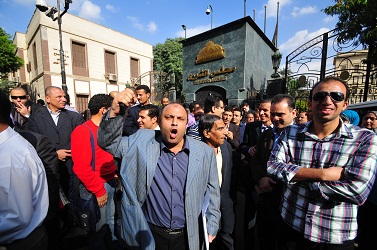By Christophe de Roquefeuil / AFP
CAIRO: Two months after he was ousted, president Hosni Mubarak was facing Monday increasing pressure to be brought to justice over alleged corruption and violence against protesters.
On Sunday, the public prosecutor said Mubarak and his two sons would be questioned, after the broadcast of an audio tape in which the former president defended his reputation, breaking a two-month silence.
Interior Minister Mansour El-Essawy said “all measures would be taken to ensure the safety of Mubarak and his sons” Alaa and Gamal when they go in for questioning, but warned they could be arrested if they fail to show up.
“If the former president and his two sons refuse to appear before the prosecution at the date to be set, the public prosecutor will be notified and legal measures will be taken,” Essawy told the official MENA news agency late on Sunday.
Mubarak and his sons will be questioned about allegations and legal complaints that they were “connected to the crimes of assault against protesters, leading to deaths and injuries,” MENA said.
The ousted president would also be quizzed on allegations of graft, it added.
An estimated 800 people were killed in clashes with police and the former president’s supporters during the protests that erupted on January 25.
In an audio message aired on pan-Arab television network Al-Arabiya, the 82-year-old Mubarak complained he was the victim of a smear campaign.
He pledged his assistance in a probe of his family’s foreign assets, but his defiance in threatening lawsuits against the media angered Egyptians who have been pressing for his trial.
After he resigned, Mubarak and his family moved to a residence in the Red Sea resort of Sharm El-Sheikh, and although he has been slapped with a travel ban, his relative freedom has remained a thorn in the side of the military rulers.
“There is enormous pressure on the army, it will have a hard time ignoring a trial indefinitely,” said Rabab Al-Mahdi, professor of political science at the American University in Cairo.
She said Mubarak’s speech on Sunday actually turned people against him.
“People got the feeling he was trying to buy time,” she said.
Weekly protests demanding Mubarak’s trial have attracted tens of thousands and eventually led to a deadly clash with soldiers trying to clear an overnight demonstration in Cairo’s Tahrir Square early Saturday.
Defiant protesters, who accused army commanders of complicity with the former president, remained in the square, although the military had pledged to disperse them, raising fears of further clashes.
By Monday, around 200 protesters gathered in Tahrir, some having spent the night. The square remained closed to traffic, with no security presence around the protesters.
But around the corner, near the Egyptian Museum – which has reopened to tourists – armored personnel carriers and other military vehicles lined the street.
“There is definitely a feeling of unease in the whole country. The armed forces have been slow to act, there are some measures which could have been taken earlier,” said Mustafa Kamel Al-Sayyed, professor of political science at Cairo University.
“If Mubarak is not brought to justice, there will be more demonstrations,” he said, adding that “it would be very difficult to stop the judicial proceedings” against the former president.
The protesters, who blocked the square with a charred army truck, barbed wire and beams, chanted slogans against military chief Field Marshal Hussein Tantawi, who has been in charge since Mubarak’s ouster.
The military acknowledged that one person died on Saturday night from a gunshot wound but denied it used force or live ammunition to disperse the protesters.
Idolized as a savior at the beginning of the revolt because it refused to crack down on protesters, the army has faced increasing criticism for stalling on reforms, not putting Mubarak in the dock and alleged human rights abuses.

